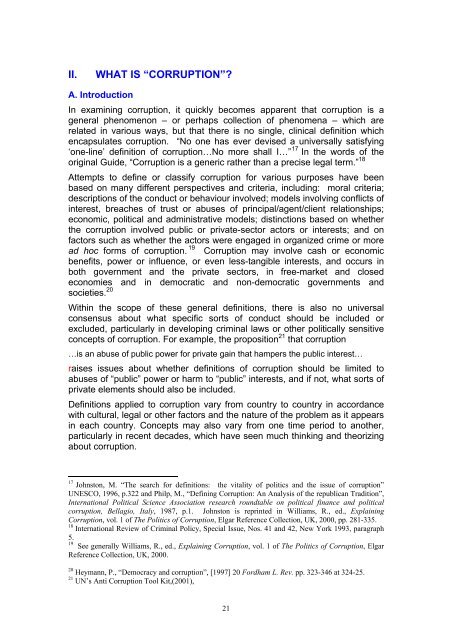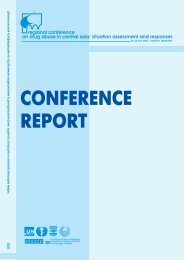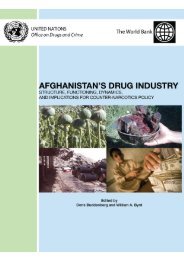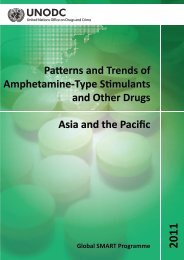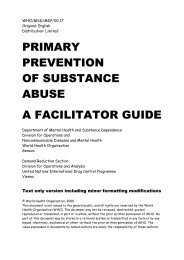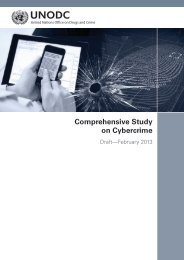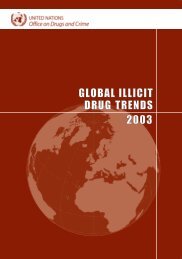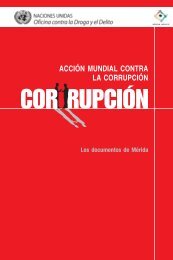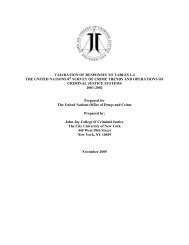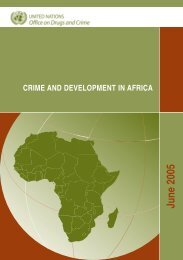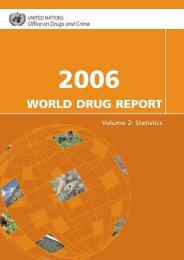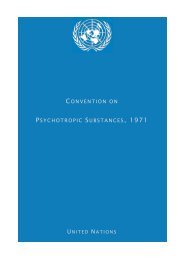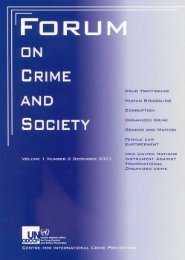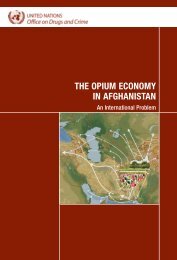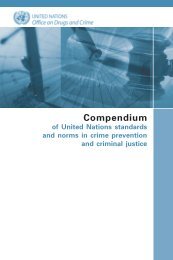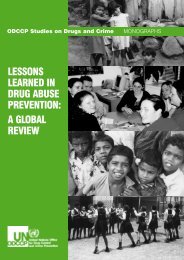UN Guide for Anti-Corruption Policies - United Nations Office on ...
UN Guide for Anti-Corruption Policies - United Nations Office on ...
UN Guide for Anti-Corruption Policies - United Nations Office on ...
You also want an ePaper? Increase the reach of your titles
YUMPU automatically turns print PDFs into web optimized ePapers that Google loves.
II.<br />
WHAT IS “CORRUPTION”?<br />
A. Introducti<strong>on</strong><br />
In examining corrupti<strong>on</strong>, it quickly becomes apparent that corrupti<strong>on</strong> is a<br />
general phenomen<strong>on</strong> – or perhaps collecti<strong>on</strong> of phenomena – which are<br />
related in various ways, but that there is no single, clinical definiti<strong>on</strong> which<br />
encapsulates corrupti<strong>on</strong>. “No <strong>on</strong>e has ever devised a universally satisfying<br />
‘<strong>on</strong>e-line’ definiti<strong>on</strong> of corrupti<strong>on</strong>…No more shall I…” 17 In the words of the<br />
original <str<strong>on</strong>g>Guide</str<strong>on</strong>g>, “<str<strong>on</strong>g>Corrupti<strong>on</strong></str<strong>on</strong>g> is a generic rather than a precise legal term.” 18<br />
Attempts to define or classify corrupti<strong>on</strong> <str<strong>on</strong>g>for</str<strong>on</strong>g> various purposes have been<br />
based <strong>on</strong> many different perspectives and criteria, including: moral criteria;<br />
descripti<strong>on</strong>s of the c<strong>on</strong>duct or behaviour involved; models involving c<strong>on</strong>flicts of<br />
interest, breaches of trust or abuses of principal/agent/client relati<strong>on</strong>ships;<br />
ec<strong>on</strong>omic, political and administrative models; distincti<strong>on</strong>s based <strong>on</strong> whether<br />
the corrupti<strong>on</strong> involved public or private-sector actors or interests; and <strong>on</strong><br />
factors such as whether the actors were engaged in organized crime or more<br />
ad hoc <str<strong>on</strong>g>for</str<strong>on</strong>g>ms of corrupti<strong>on</strong>. 19 <str<strong>on</strong>g>Corrupti<strong>on</strong></str<strong>on</strong>g> may involve cash or ec<strong>on</strong>omic<br />
benefits, power or influence, or even less-tangible interests, and occurs in<br />
both government and the private sectors, in free-market and closed<br />
ec<strong>on</strong>omies and in democratic and n<strong>on</strong>-democratic governments and<br />
societies. 20<br />
Within the scope of these general definiti<strong>on</strong>s, there is also no universal<br />
c<strong>on</strong>sensus about what specific sorts of c<strong>on</strong>duct should be included or<br />
excluded, particularly in developing criminal laws or other politically sensitive<br />
c<strong>on</strong>cepts of corrupti<strong>on</strong>. For example, the propositi<strong>on</strong> 21 that corrupti<strong>on</strong><br />
…is an abuse of public power <str<strong>on</strong>g>for</str<strong>on</strong>g> private gain that hampers the public interest…<br />
raises issues about whether definiti<strong>on</strong>s of corrupti<strong>on</strong> should be limited to<br />
abuses of “public” power or harm to “public” interests, and if not, what sorts of<br />
private elements should also be included.<br />
Definiti<strong>on</strong>s applied to corrupti<strong>on</strong> vary from country to country in accordance<br />
with cultural, legal or other factors and the nature of the problem as it appears<br />
in each country. C<strong>on</strong>cepts may also vary from <strong>on</strong>e time period to another,<br />
particularly in recent decades, which have seen much thinking and theorizing<br />
about corrupti<strong>on</strong>.<br />
17 Johnst<strong>on</strong>, M. “The search <str<strong>on</strong>g>for</str<strong>on</strong>g> definiti<strong>on</strong>s: the vitality of politics and the issue of corrupti<strong>on</strong>”<br />
<str<strong>on</strong>g>UN</str<strong>on</strong>g>ESCO, 1996, p.322 and Philp, M., “Defining <str<strong>on</strong>g>Corrupti<strong>on</strong></str<strong>on</strong>g>: An Analysis of the republican Traditi<strong>on</strong>”,<br />
Internati<strong>on</strong>al Political Science Associati<strong>on</strong> research roundtable <strong>on</strong> political finance and political<br />
corrupti<strong>on</strong>, Bellagio, Italy, 1987, p.1. Johnst<strong>on</strong> is reprinted in Williams, R., ed., Explaining<br />
<str<strong>on</strong>g>Corrupti<strong>on</strong></str<strong>on</strong>g>, vol. 1 of The Politics of <str<strong>on</strong>g>Corrupti<strong>on</strong></str<strong>on</strong>g>, Elgar Reference Collecti<strong>on</strong>, UK, 2000, pp. 281-335.<br />
18 Internati<strong>on</strong>al Review of Criminal Policy, Special Issue, Nos. 41 and 42, New York 1993, paragraph<br />
5.<br />
19 See generally Williams, R., ed., Explaining <str<strong>on</strong>g>Corrupti<strong>on</strong></str<strong>on</strong>g>, vol. 1 of The Politics of <str<strong>on</strong>g>Corrupti<strong>on</strong></str<strong>on</strong>g>, Elgar<br />
Reference Collecti<strong>on</strong>, UK, 2000.<br />
20 Heymann, P., “Democracy and corrupti<strong>on</strong>”, [1997] 20 Fordham L. Rev. pp. 323-346 at 324-25.<br />
21 <str<strong>on</strong>g>UN</str<strong>on</strong>g>’s <str<strong>on</strong>g>Anti</str<strong>on</strong>g> <str<strong>on</strong>g>Corrupti<strong>on</strong></str<strong>on</strong>g> Tool Kit,(2001),<br />
21


